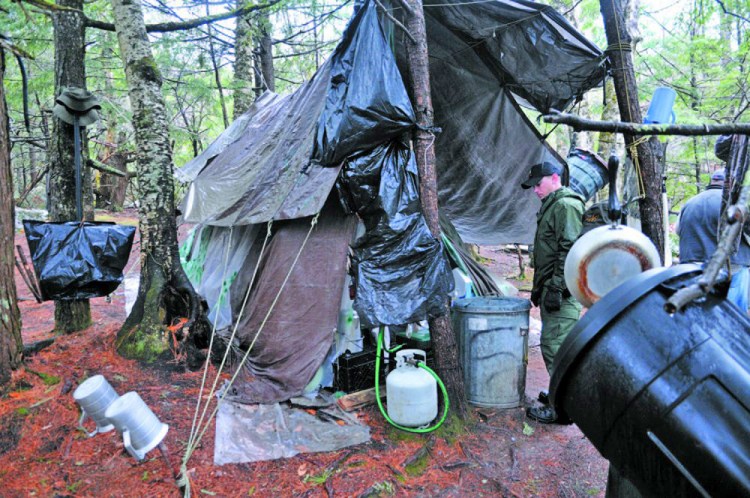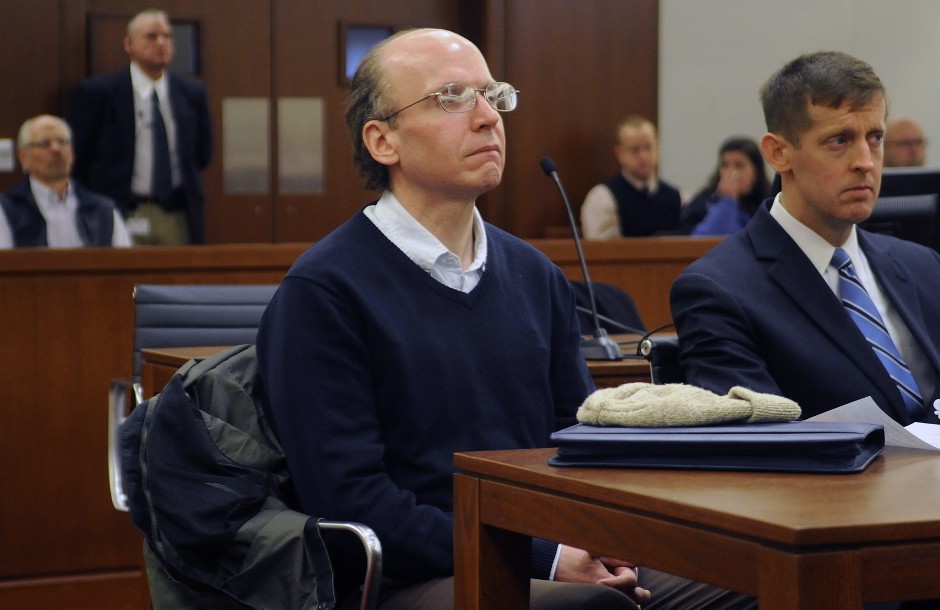EAST MACHIAS — Christopher T. Knight, the man known as the North Pond hermit, has been keeping up with restitution payments for the things he stole from camps and cottages while living alone in a wooded campsite in Rome for almost three decades, the state says.
But his attorney argued Thursday before six Maine Supreme Judicial Court justices that Knight should not have to also pay for repairing a dirt camp road that Maine State Police damaged in the process of taking down his campsite in 2013.
Kennebec County Deputy District Attorney Paul Cavanaugh argued that Knight should pay $1,125 for the gravel and regrading.
Oral arguments in the appeal were held at Washington Academy, where about 425 students and their teachers watched the proceedings. Knight, who remains on probation, did not attend the hearing.
Knight grew up in Albion, but left civilized society after high school to spend some 27 years alone in the woods in campsites he outfitted with items stolen from cottages and camps in Rome and Smithfield.
Authorities caught Knight breaking into the Pine Tree Camp three years ago, and the case drew worldwide media attention.
In 2015, after completing a specialty court program for individuals with mental health and substance abuse problems, Knight was sentenced on burglary and theft charges and ordered to serve seven months in jail – time he had already served – and the remainder of the five-year sentence was suspended. He is now serving three years of probation, which ends March 22, 2018, according to the state Department of Corrections.
On Thursday, Cavanaugh said Knight was meeting conditions of probation, including paying $25 a month toward restitution.
Knight’s attorney, Walter McKee, said Knight does not have the money to pay for the road repairs, and that he should not have to because the road repair was “so far attenuated or removed from the crime for which he was convicted” and could lead to numerous other costs assessed to people, such as a bridge built to an island so firefighters could fight a fire.
“There are no individual victims here,” McKee said. “The victims are the state police.”
Associate Justice Andrew Mead asked whether the state was trying to make the defendant underwrite the cost of the investigation.
Associate Justice Jeffrey Hjelm asked whether there had been prior attempts to resolve the dispute over the road repair money.
“The amount of money at issue here is a little over $1,000,” he said. “The amount of money expended on this appeal far exceeds that.”
McKee said attorneys had tried to find a resolution but failed.
“Chris could not agree to this issue,” McKee said. “He is very principled. He said, ‘I am willing to pay for what I took from people; that is perfectly appropriate. I am willing to do my time, so to speak. But I’m not willing to pay money for what the state police expended for fixing a road as part of their work.’ ”
Hjelm also noted that the woman who owned the property where Knight had his camp was not named as a victim of any of the crimes.
“For there to be consideration of restitution, the person who is entitled to the money has to be the named victim of the charges,” Hjelm said.
McKee said Knight paid restitution to the state “for the actual victims here.” McKee said the statute under which the restitution is being sought was aimed at costs of cleaning items such as methamphetamine laboratories.
Associate Justice Ellen Gorman asked, “Why should the restitution statute be read to say in addition to what the public already does to pay for the investigations and to pay for what they do to investigate and prosecute crimes, we should also require other persons to pay for that work?”
Cavanaugh said criminals should bear the financial burden.
“Between the innocent taxpayer supporting the state police or the criminal that caused that, it should be more about a criminal,” Cavanaugh said.
Chief Justice Leigh Saufley asked Cavanaugh whether the court should side with the defendant when the law is not crystal clear.
Cavanaugh said, “Despite Mr. McKee’s arguments, it is crystal clear that it is covered.”
The Maine Supreme Judicial Court issues its decisions later in writing.
Copy the Story LinkSend questions/comments to the editors.





Success. Please wait for the page to reload. If the page does not reload within 5 seconds, please refresh the page.
Enter your email and password to access comments.
Hi, to comment on stories you must . This profile is in addition to your subscription and website login.
Already have a commenting profile? .
Invalid username/password.
Please check your email to confirm and complete your registration.
Only subscribers are eligible to post comments. Please subscribe or login first for digital access. Here’s why.
Use the form below to reset your password. When you've submitted your account email, we will send an email with a reset code.